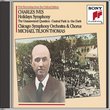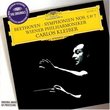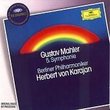| All Artists: Franz Schubert, Mitsuko Uchida, Ian Bostridge Title: Schubert: Die Schone Mullerin Members Wishing: 0 Total Copies: 0 Label: EMI Classics Release Date: 3/1/2005 Genres: Pop, Classical Styles: Vocal Pop, Chamber Music, Historical Periods, Classical (c.1770-1830) Number of Discs: 1 SwapaCD Credits: 1 UPC: 724355782724 |
Search - Franz Schubert, Mitsuko Uchida, Ian Bostridge :: Schubert: Die Schone Mullerin
 | Franz Schubert, Mitsuko Uchida, Ian Bostridge Schubert: Die Schone Mullerin Genres: Pop, Classical
Ian Bostridge has long been associated with Schubert's songs and admired for his highly personal approach to them. This is his second recording of Die schöne Müllerin. He preserves the songs' original keys and hi... more » |
Larger Image |
CD DetailsSynopsis
Amazon.com Ian Bostridge has long been associated with Schubert's songs and admired for his highly personal approach to them. This is his second recording of Die schöne Müllerin. He preserves the songs' original keys and his light, bright tenor is perfect for the young miller-journeyman who finds work but loses his heart. Wilhelm Müller wrote his poems for a popular domestic pastime, charades. His heading, "To be read in Winter," indicates their light-hearted nature. Schubert's music, however, gives this literary fluff emotional weight and intensity, taking the hero on an inward journey from naïve, carefree optimism through ecstasy and jealousy to suicidal despair. Composed in 1823, the year Schubert's syphilis was diagnosed, the Müllerin's downward spiral suggests a personal parallel to some commentators. In his program notes, Bostridge rejects this but explores other psychological connections and ambiguities in both the words and the music. This may account for a certain lack of spontaneity and simplicity in his singing: his exaggerated contrasts of dynamics, articulation, nuance and inflection, as well as his habit of delaying and swelling his vibrato, sound mannered and artificial. However, when he lets his voice flow out freely, it is glorious, radiant with transparent light. Mitsuko Uchida, herself a renowned Schubert interpreter, evokes an outer and inner landscape of bright and muted colors, murmuring brooks, turning mill-wheels, hopes, joys, sorrows, tears and death. --Edith Eisler Similar CDs
Similarly Requested CDs |
CD ReviewsIn a Realm of its Own Grady Harp | Los Angeles, CA United States | 03/31/2005 (5 out of 5 stars) "Three aspects make this extraordinary recording one to treasure: Franz Schubert, Mitsuko Uchida, Ian Bostridge. Schubert song cycles have long been the testing ground for both singers and pianists, so revealing are they of technique and depth of musicality, and for this listener these artists surpass expectations and create the gold standard by which all future performances must be judged. Both of the artists, here captured in perfect form by the EMI engineers, are at the peak of their careers. Mitsuko Uchida has garnered accolades for her performances of many composers' works for solo piano, piano with quartet, and concerti and yet her interpretations of Schubert's oeuvre seem closest to her soul. Here she is eloquent in her collaboration with tenor Ian Bostridge and the result is a recital of "Die Schone Mullerin" that is now the finest on record. Ian Bostridge is a unique tenor. His range is such that his lightness of touch is the most delicate of tenor tones and yet he is equally comfortable in the lower ranges of these songs, sound like the lyric baritone that he comfortably couples with his tenor range. The poetry of the music, the moods, the breathing between phrases and between songs - all are palpably correct. But it is the collaboration of these two artists that create the absolute equality of Schubert's intentions. There are other very fine recordings of this cycle but few can match the sublime artistry and conviction and virtuosity of their perfect "Die Schone Mullerin". Highly recommended. Grady Harp, March 05" Keeping the Spiritual Ideal Alive Cinemaseekers | 03/14/2005 (5 out of 5 stars) "Every once in a while a performer comes along, who transcends the medium he is working in. Ian Bostridge is just such a performer. For us, he has come to symbolize spirituality in art. It might seem redundant to describe classical music (and Schubert Lieder in particular) as spiritual, and yet in today's world "spirituality" is quite the last word to be used in praise of someone's performance. Perhaps, it is a sign of the times that this quality is no longer valued (neither in life nor in art). Or perhaps, it is just assumed that the work of a truly great composer can survive any performance and still retain its inherent spiritual value. The latter might be true to some extent - but, oh, how much greater the impact of a work of Mozart, Beethoven or Mahler in the hands of Furtwangler or Bernstein! And Ian Bostridge has become a master of Lieder on that level, as this recording of "Die schone Mullerin" proves. Somehow he is able to unearth more of the spiritual depths of the great Lieder masterpieces than any other performer and make their inherent spirituality much more tangible, more alive and more significant for a contemporary audience. It is not only his superb diction combined with impeccable intonation that makes this possible, but above all else, it is his connection to the Ray of Purity in Creation. Purity has nothing to do with puritanism, but is a natural and necessary condition of the healthy spirit. Since most of us have completely lost touch with this basic quality of the spirit, it becomes essential to be reminded of what it feels like when the strings of one's soul are touched in this very special, delicate and indescribable way. This is where all genuinely great art has its high Calling. It is not necessary (though preferable, of course) that an artist's whole life should already be based on purity, what is necessary is that in the act of the execution of his Calling he is able to find a connection to Purity, which alone opens the gate to that level of artistry we generally regard as "sublime'. This is also the reason why Mr. Bostridge's voice possesses such youthful freshness, which many people have already commented on. Purity always has this refreshing and uplifting effect, because it issues from the child-like quality of the imperishable spirit and is not dependent on the person's actual age. And this child-like wonder is what characterizes the protagonist of "Die schone Mullerin". Talking to a brook, hearing the singing of the water-nymphs, turning to nature in both joy and sorrow is a way of life, which has come to be associated with poets or lovers, but which in reality should be part of our everyday experiencing, had we not deviated so sharply from our normal course of spiritual development. And this heightened state of being is what Bostridge brings to the work, infusing it with all the vigor and enthusiasm which usually only youth has at its disposal, but which the connection to the Luminous Heights of the spirit grants at any time. And when one "hears" this special luminosity in the voice ringing out right from the start, in the opening songs of the cycle, one can't help wondering: has there ever been a more spiritual singer? Together with Bostridge, we find ourselves reliving the joy and naiveté of youth's first love - without the "help" of psychoanalysis, which is always the quickest way to murder all fresh and genuine experiencing (in life as well as in art). This "murdering" inevitably occurs because psychoanalysis fails to take into consideration the spiritual essence of man, instead directing everything downwards (literally and figuratively) towards the lowest common denominator. It denies man a chance to see the perfection of the ideal in what is yet imperfect as real. And yet it is just the longing for the ideal that makes a human being, that shapes him into what he should become in Creation - just as the lack of that longing makes him into something that he was never meant to become. As Oscar Wilde so keenly observed: for all its intellectual appeal, cynicism is a perfect philosophy for a man without a soul. Genuine love, like nothing else, helps us to strive upwards to the height of existence worthy of man, so it is essential not to succumb to cynicism in these matters by quickly putting things into a sobering "perspective". The great German philosopher, writing under the name of Abd-ru-shin, restores the natural perspective on a man/woman relationship: "...in every normal development all that is womanly exercises a strong and solely uplifting influence (which in its unconscious beginnings always swings purely) upon the male as soon as the latter attains physical maturity. With physical maturity there simultaneously awakens the great generative sensing, which forms the connection or the bridge for the activity of the spiritual core of earthman in the plane of coarse matter, i.e., here on earth.... This is the absolutely natural process in the swinging of the undimmed radiations in accordance with the Laws in Creation. All else is distorted!" (Abd-ru-shin, "IN THE LIGHT OF TRUTH: THE GRAIL MESSAGE" - "IM LICHTE DER WAHRHEIT: GRALSBOTSCHAFT") There is no question that Schubert carried the longing for the ideal of womanhood deep within his soul, as practically every one of his songs testifies. It was the longing that no amount of life's disappointments could tarnish. His irony never turned into cynicism, and his despair only served to intensify his longing. The last five songs of this cycle are performed by Mr. Bostridge with devastating beauty and with the subtlety of shading that borders on the unbelievable. Mitsuko Uchida is a marvelous partner for him: she has that wonderful feminine presence to her, in the best sense of the word. She is lyrical and sensitive, powerful when needed, but never harsh or aggressive. Together they create an atmosphere, which is at once spontaneous and masterfully controlled. Mitsuko Uchida seems to have a liberating effect on Mr. Bostridge, where as Mr. Andsnes always seemed to us to have a somewhat constricting effect on him, lacking the subtlety to match Bostridge's. So for us, their recording of "Winterreise" is like a rose that never quite unfolded. By contrast, this recording with Mitsuko Uchida is a rose in full, glorious bloom: breathtakingly beautiful, and so alive and natural as if it never could have formed in any other way. This said, it is still the incomparable Julius Drake, who in our view remains the most ideal partner for Mr. Bostridge. Their work together stands on a plateau all its own. Their recording of "Winterreise", which was done some years ago for David Alden's film (for television) seems quite unsurpassable to us. That film, by the way, is a masterpiece of poetic filmmaking, in which Mr. Bostridge (in addition to his singing) delivers the most riveting, heart-wrenching portrayal of the protagonist of "Winterreise". The ideal of ennoblement, profundity, solemnity is what distinguishes Ian Bostridge's artistic persona and sets him apart from all other performers: making an impact on the world through sublimity and reawakening the longing for the spiritual ideal in the hearts of his listeners. It is this that insures the living connection with the Light! " Uneven acoustics Tom Lawrence | Cambridge, MA USA | 10/07/2006 (2 out of 5 stars) "As many times as I've listened to this recording I can't get past the acoustics to enjoy the performance. The piano sounds like it was recorded under a horse blanket, dampening any brightness or upper partials. The singer sounds like he is in a phone booth, all brightness with no lower resonance. It is as if the engineers did not want the piano to interfere with the lightness of Bostridge's voice. Unfortunately, the result isolates each performer in the frequency spectrum, making it hard for me unify what I am hearing."
|

 Track Listings (20) - Disc #1
Track Listings (20) - Disc #1





